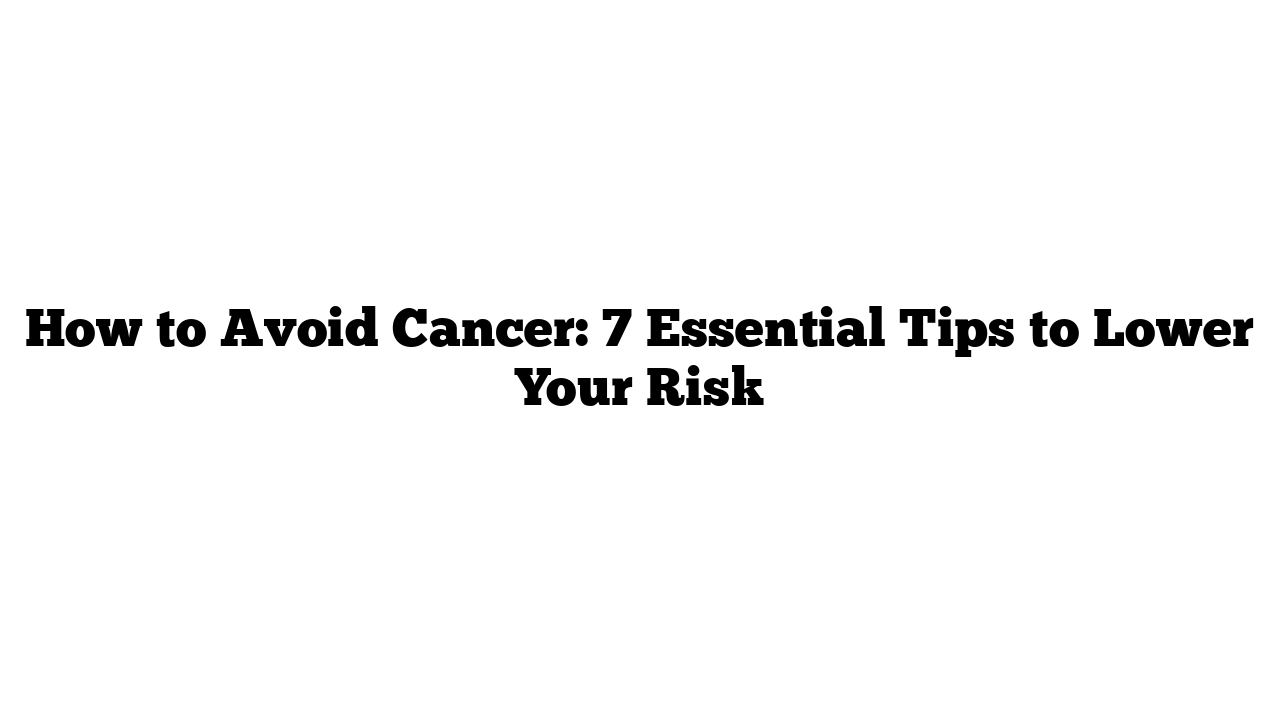Cancer is one of the leading causes of death worldwide, claiming nearly 10 million lives in 2022. In the USA, it affects 40% of people during their lifetime, making it critical to understand how lifestyle choices can influence our chances of developing this disease. While our genes play a role, studies show that nearly half of cancer deaths in men and 40% in women are linked to preventable factors. So, how can we take control and reduce our cancer risk?
In this article, we’ll explore seven lifestyle habits backed by research that can help you avoid cancer, including practical tips you can start applying right now.
1. Avoid Excessive Sun Exposure
Too much sun can damage your skin cells, leading to skin cancer, one of the most common types in the United States. Those who work outdoors are at 60% higher risk of developing skin cancer. To protect yourself:
- Limit sun exposure, especially between 10 a.m. and 4 p.m. when UV rays are strongest.
- Wear sunscreen with SPF 50 or higher, and choose protective clothing.
I personally use Beauty of Jos Sunscreen (SPF 50), which is free from potentially harmful ingredients flagged by the FDA. For a mineral-based alternative, Seriv 100% Mineral Sunscreen SPF 50 is a good choice, though it can leave a white film.
2. Get Regular Exercise
Exercise is a powerful way to strengthen your immune system and reduce cancer risk. Studies show that people who exercise for 7.5 to 15 hours per week have a lower risk of developing colon and breast cancers. It doesn’t have to be intense; find an activity you enjoy! Whether it’s walking, dancing, or biking, aim for 30 minutes a day. For busy days, consider exercise snacks—short bursts of physical activity like push-ups or sit-ups.
3. Eat a Healthy Diet
A balanced diet can help keep your cells strong and better able to handle damage that could lead to cancer. Studies show that a healthy diet is linked to lower risks of certain cancers. Here’s how to improve your eating habits:
- Avoid processed meats and ultra-processed foods, which are linked to higher cancer risks, especially colon cancer.
- Focus on a Mediterranean diet, rich in vegetables, fruits, whole grains, fish, and olive oil. This diet has been shown to reduce the risk of cancer deaths by 6%.
- Eat fiber-rich foods, such as beans, nuts, and whole grains.
4. Limit Alcohol Consumption
Alcohol increases the risk of several cancers, including those of the mouth, throat, liver, and breast. Even small amounts of alcohol can raise your cancer risk. One drink per day is linked to a higher risk of cancer, so it’s best to minimize or avoid alcohol altogether to lower your cancer risk.
5. Maintain a Healthy Weight
Obesity is a major risk factor for cancer, responsible for 40% of cancers in the U.S. Excess body fat increases inflammation and encourages abnormal cell growth. Studies show that people who lose weight through methods like gastric bypass surgery have a 60% lower risk of dying from cancer. Achieving and maintaining a healthy weight is crucial in reducing cancer risk. Eating well and staying active are the best ways to manage your weight.
6. Don’t Smoke
Smoking is the leading preventable cause of cancer, contributing to 21% of all cancer deaths globally. The risk of lung cancer is especially high among smokers, but it also raises the risk of other cancers. If you smoke, quitting can significantly reduce your risk. Research shows that cutting back can also help: smoking just 15 cigarettes a day instead of 20 can lower your lung cancer risk by 20%.
Quitting smoking can be challenging, but there are resources available, including medications and support groups, to help you along the way. It’s never too late to stop smoking and reduce your cancer risk.
7. Protect Against Infections Linked to Cancer
Certain infections, such as the HPV virus, are linked to cancers like cervical cancer. Vaccination against HPV has been shown to prevent cervical cancer, with no cases reported among women who were fully vaccinated in Scotland. In fact, 13% of all cancers worldwide are linked to infections. Vaccinating against viruses like HPV is one of the best preventive measures you can take.
Cancer Screening: The Key to Early Detection
Even if you follow all these steps, cancer can still occur, which is why early detection is so important. Screening tests, such as those for breast, colon, cervical, and prostate cancers, help detect cancer before symptoms appear, increasing the chance of successful treatment.
Currently, many cancers do not have widespread screening methods. However, new blood tests are being developed that can detect a wide range of cancers early by identifying tiny pieces of DNA or proteins from cancer cells. While these tests show great promise, more research is needed to determine their effectiveness for general use.
Practical Tips for Reducing Cancer Risk
In summary, here are the most important steps you can take to reduce your cancer risk:
- Limit sun exposure and use sunscreen.
- Stay physically active with regular exercise.
- Eat a healthy, balanced diet and avoid processed foods.
- Limit alcohol and avoid smoking.
- Maintain a healthy weight and avoid obesity.
- Get vaccinated against cancer-causing infections like HPV.
- Regularly screen for cancer to catch it early.
By making these changes, you can dramatically reduce your risk of cancer and live a healthier, longer life.
For more health tips, visit medicaltimes.io for articles written by trusted healthcare professionals.
